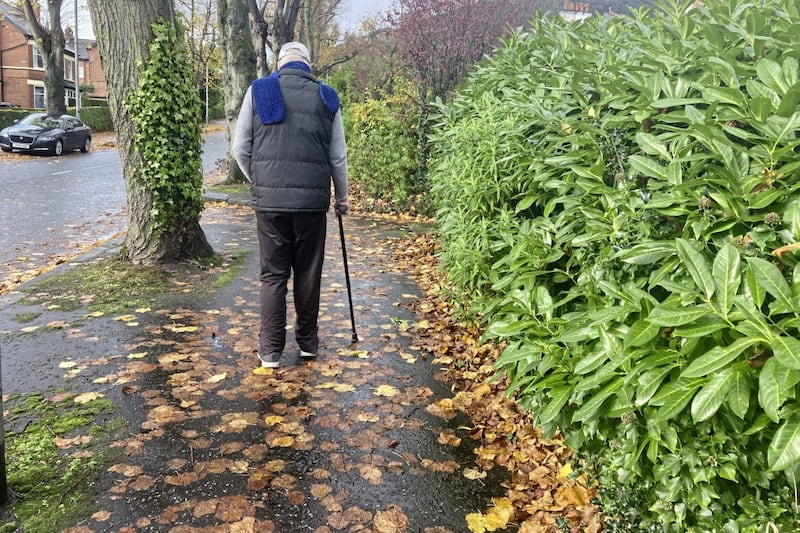LIKE so many, I have had the most awful head cold, hacking cough, bunged up and then it was just like a plug had been pulled and I couldn’t get hankies to my poor red nose quickly enough.
I went to a chemist to get a cough bottle and was surprised when the assistant asked me not only what my symptoms were but was I on any heart medication. I told her statins and she wouldn’t sell me a bottle from the popular range she had behind the counter.
Instead she produced a thyme herb and marshmallow root extracts syrup.
It made me think. A cough bottle is just a cough bottle - or is it? Often they contain a mix of medical ingredients and some might fight with your own regular medication so the advice is to ask your doctor or a pharmacist before purchasing.
If the cough medicine contains paracetamol and you are on paracetamol tablets already, for pain for instance, then the danger is you’ll take too much and do yourself harm. If you are diabetic, check the contents for sugar.
I then looked at the instruction leaflet with popular Lemsip and the warning list is long - check with your pharmacist if you taking beta-blockers for high blood pressure, in fact any drugs to treat hypertension or blood thinning agents like warfarin. Would you have known that? Neither did I.
Apparently drinking water is the best way of clearing your head of mucus but when I was little and had a sore throat and a cough my granny would roll half a dozen pats of butter in coarse brown sugar, I would put them on my tongue one at a time and allow the butter to melt, this soothed the throat and the sugar scratched the tickle.
Anything my granny did worked so this remedy was magic. In our family, when catarrh developed it was a case of buying menthol crystals and iodine, mixing them in boiling water, cooling a little and then inhaling the fumes using a towel to cover your eyes. hat, and a good rub with Vicks, cleared the tubes immediately.
So maybe my herbal cough bottle is the answer, certainly since yesterday I have only coughed twice. Progress.
Food For Thought
Dear Anne,
Please tell me, what is a cookie - not to eat but on my computer?
Joan
One is delicious and the other, for the likes of you and me, Joan, is a complex subject! For someone at ease with technology and the internet it’s an ok thing and cookies are useful little storage boxes and they are just the way the internet works. Technically a cookie is a piece of information that a website asks your browser to store on your computer or mobile device. This cookie allows the website to log your actions and preferences over time.
These small text files placed on your hard drive by a web page server are 'identification cards' between you and the server. They remember what pages you have accessed and bring you back to them quickly so saving you time; I suppose it’s a ready reckoner in a way.
Whether you realise it or not, if you are on a computer or laptop like me, cookies are involved. They are a sort of central pathway for information, if you order something from the likes of eBay or Amazon you’ll do so by use of a cookie that remembers your instructions and doesn’t let you forget!
Firms and organisations can also connect you with ads that they think will interest you and based on your past orders or browsing habits.
I looked up some information on a fashion firm some weeks ago and now I’m constantly being offered garments from a range of stores and that’s because cookies have kicked in and see me as a source of income.
Sadly your information can be shared with other relevant parties. No way to stop this apparently; not sinister (depending on what you are sourcing) just annoying.
Can you avoid them? In some cases you will be asked if you accept or not, in other cases you will be told that by visiting the particular site you are automatically accepting.
Who polices this? There is EC legislation stating browsers can’t store information without permission but it seems to me they have found ways round this; i.e. assuming you have accepted if you continue and, as consent runs for 30 days recurring, this means you could be agreeing for the rest of your life.
The exact legislation can be sourced by going into the search engine with ec.europa.ec/ipg - this is the information provider’s guide.
I have found, especially with some government departments, that the information I am trying to find - a contact telephone number for instance - is obscured when cookie information drops down over the screen.
I’m told this is probably because the designer or programmer is more than likely working on a big screen but when it’s squashed up on my little screen it causes frustration.
So it seems, if given the choice, you can decline a cookie, if not given the choice just put up with it. Such is progress. Just have a cup of coffee and a cookie biscuit, Joan, and accept the alarming pace of technology.
And as for that LinkedIn thing. I must have pushed a button at some time and now I’m constantly having to delete people I’d love to get in touch with because it doesn’t work when I say connect. But that’s for another day...









